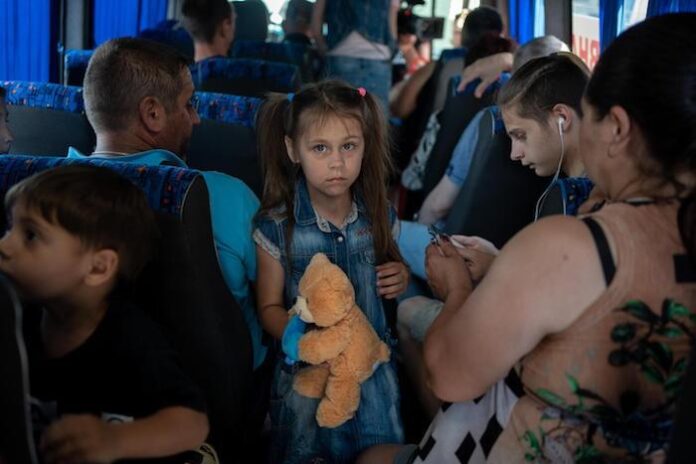UNICEF is distributing urgently needed water, sanitation supplies and humanitarian cash transfers to aid families affected by the attack on the Kakhovka dam, while skilled mobile response teams provide psychosocial support for children on the move.
On June 7, 2023, 7-year-old Anya and her 15-year-old brother, Ernest (with headphones), evacuate Kherson by bus with their father and other family members following the June 6 attack on the Kakhovha hydroelectric dam in southern Ukraine.
© UNICEF/UN0853473/Filippov
UNICEF and other humanitarian agencies are coordinating with the Ukrainian government to aid children and families as evacuation continues following the June 6 collapse of the Karkhovka hydroelectric dam in southern Ukraine.
“I was afraid of drowning at first, but I didn’t.”
Clutching a stuffed animal, 6-year-old Masha evacuated by bus with her mother on June 7. They left their home on the flooded outskirts of Kherson and all their belongings behind.
“Today, for the first time in my life, I went in a boat,” the little girl said. “I was afraid of drowning at first, but I didn’t.”
On June 7, 2023, Masha, 6, and her mother evacuated from Kherson by bus after the collapse of the Kakhovka dam in southern Ukraine.
© UNICEF/UN0853482/Filippov
At least 40 towns and villages are flooded. Government authorities estimate that 17,000 people in Ukraine-controlled territory west of the Dnipro River and 25,000 people on the east bank of the river could be affected.
Families displaced by the dam attack need safe drinking water
On June 6, 2023, UNICEF distributed drinking water and kits containing hygiene and baby supplies to families evacuating on the first train from Kherson to Mykolaiv following the destruction of the Kakhovka hydroelectric dam in southern Ukraine.
© UNICEF/UN0853312/
Rescuers have been rushing to reach people stranded on the roofs of their homes in flooded sections of Kherson city. Many houses and gardens have been destroyed by the floodwaters, along with farmland and irrigation systems.
Safe drinking water that once came from the reservoir above the dam is now in short supply, prompting fears of a surge in waterborne diseases.
UNICEF has provided 25,000 bottles of water — with 90,000 more on the way, over 10,000 water purification tablets and 1,700 hygiene kits to families in need, among other supplies.
UNICEF humanitarian cash transfers will help families purchase essential items
The rescue of local residents continues following the June 6 collapse of the Kakhovka hydroelectric dam in southern Ukraine.
© UNICEF/UN0853467/Filippov
Damian Rance, UNICEF Ukraine Chief of Communications and Advocacy, said humanitarian cash transfers have already been sent to approximately 3,500 families affected by the dam collapse. Families will be supported for three months, covering up to five people per household. Registration for further cash transfers is ongoing.
UNICEF teams of trained medical professionals and psychologists are stationed at transit and evacuation points to provide psychosocial support for children on the move and to aid families. UNICEF has also set up child-friendly Spilno centers where children can play with their peers and feel a sense of normalcy, however brief.
Attacks on critical infrastructure are attacks on children
Mykyta, a 14-year-old boy from Kherson, had to climb through a second-floor window to enter a rescue boat after he and his grandparents and his dog, George, were trapped on the fourth floor of their apartment building, surrounded by floodwaters.
© UNICEF/UN0853468/Filippov
Fifteen-year-old Ernest and his four siblings were evacuated, along with the rest of their family, in a red amphibious vehicle.
Seated on a bus with his 7-year-old sister, Anya, the boy struggled to process the collapse of the dam and its aftermath. “I saw the water just flowing down my street,” he said. “I am simply shocked.”
Ernest’s family home has been destroyed, its roof swept away in the floodwaters. Ernest’s father, Dmitry, was only able to take the family’s documents and his children’s belongings with him.
“We survived the war in this house,” Dmitry said. “Everything is flooded. The entire area is underwater, with the water level well above the ground floors.”
The streets in the central part of Kherson city are flooded up to 16 feet in some places, and the ground floors of buildings are completely submerged.
© UNICEF/UN0853471/Filippov
More than a year of war has had a devastating impact on Ukraine’s 7.5 million children. UNICEF continues to stay and deliver for the people of Ukraine — and remains committed to working with partners to support children and families through the war and beyond.
Learn more about UNICEF’s Ukraine and Refugee Response 2023 Appeal, which details UNICEF’s strategy and plans to meet immediate and long-term needs of 9.4 million people, including 4 million children.
Support UNICEF’s emergency response efforts in Ukraine and around the world. Your contribution can make a difference. Donate today.


